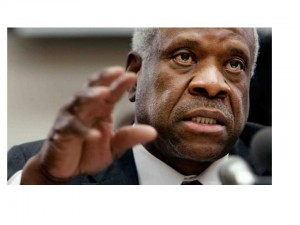
It is inevitable that Christians who would now be described as “liberal” will be the overwhelming majority of Christians in America. That sea change, the waters of which we already feel swelling everywhere around us, can no sooner be stopped than can the moon passing across the night sky. Today’s conservative evangelical Christians who are rallying against “postmodern relativism,” “revisionist secular theology,” “a naturalistic doctrine of God,” or however else they might label the theology of the left, are like yesterday’s horse-and-buggy owners rallying against the newfangled automobile.
The future of transportation was obvious then; the future of Christian theology is obvious now.
Please note the difference between “inevitable” and “good.” I’m not saying that the rise of the Christian left is a good thing (though I personally believe that it is). I’m saying it’s inevitable. And the reason that’s true is as obvious as a Buick parked in your living room.
In the old days, it was easy for the vast majority of American Christians to believe that, say, Jews and homosexuals (to name but two of the many, many groups Christians traditionally so destine) are going to hell. And what made it so emotionally and spiritually comfortable for so many Christians to assert that? Because none of them knew any Jews or homosexuals. No Jews or gays had a nearby farm; no Jews or gays were at the county fair; no Jews or gays attended the local PTA meetings; you never ran into either at the hardware store. The Jews were (however involuntarily) sequestering themselves in places like New York City; and while you may have interacted with a gay man over in the pipes department, that was his secret.
As far as most Americans knew (or, of course, cared to know), white was right, God shed his grace upon them, and happy days were afoot.
That was yesterday. Today most people have in their lives, and deeply care for, at least one person who is no closer to being a Protestant Christian than I am to being French Canadian. Today everyone is related to, shares a neighborhood with, works with, or goes to school with someone who is gay, Jewish, Muslim, Catholic, Buddhist, Sikh, Hindu, Mormon, Unitarian Universalism, Wiccan, Native American, Shinto, Baha’i, Rastafarian, Cao Dai, Tenrikyo, agnostic, atheist, or any combination thereof. (Humans. We are a creative group, are we not?)
It’s a great deal more troubling to condemn to hell someone for whom you have affection than it is an abstract member of an abstract group. Growing up in my white suburban neighborhood, I didn’t know a single person who was Hindu. Today there are five young men who are Hindu living right next door to me.Those young men have become friends. If part of my theology insists that my Hindu friends are going to hell, you better believe I’m going to reassess that part of my theology. I wouldn’t be human if I didn’t.
It’s typical to think that theology is static and permanent. It’s not, though. What’s true instead is that theology follows sociology. And slowly but surely weare all becoming members of one big society. At the very least media generally, and the Internet in particular, has made world travelers, and culture tourists, of us all.
The world is rapidly changing. And as surely as one day follows the next, Christian theology, as it always has (slavery, anyone?) will change right along with it. As our world grows smaller, our Christianity will grow larger, broader, more inclusive.
Last month the Public Religion Research Institute found that 44 percent of young evangelicals between the ages of 18 and 29 support gay marriage. It also found that 52 percent of all Catholics—despite the explicit teachings of the Catholic church—favor same-sex marriage.
Polls consistently now show that in America support for gay marriage is no longer the minority opinion.
This past May, Focus on the Family president Jim Daly said this in an interview with WORLD magazine:
We’re losing on [the issue of homosexuality], especially among the 20- and 30-somethings: 65 to 70 percent of them favor same-sex marriage. …. We’ve probably lost that. I don’t want to be extremist here, but I think we need to start calculating where we are in the culture.
When the president of Focus on the Family basically gives up on the gay issue, you know things have changed.
The religious right can rail, and scream, and protest all it wants that (to quote Albert Mohler) “Liberalism just does not work.” Mohler may be perfectly correct. I personally believe that he is not; I think that assertion reveals a sad lack of faith in the enduring nature of human goodness.
Either way, one thing is certain: We—and certainly our children—will find out.
 Just out: John’s UNFAIR: Why the “Christian” View of Gays Doesn’t Work. (Softcover edition; Kindle edition; NookBook edition). You’re invited to “like” John’s Facebook page, and also his group Unfundamentalist Christians, the motto of which is “Above all, love.”
Just out: John’s UNFAIR: Why the “Christian” View of Gays Doesn’t Work. (Softcover edition; Kindle edition; NookBook edition). You’re invited to “like” John’s Facebook page, and also his group Unfundamentalist Christians, the motto of which is “Above all, love.”




Robert
14 Mar 2012I may disagree with Shore’s conclusions, but I appreciate you posting this
Letitia
14 Mar 2012I am glad to hear that some people have a positive attitude to the future of Christianity in the USA. From the outside, all that is seen or heard is a massive – and apparently growing – religious right pedling hate and division. The impression gained from the media is one of a nation united against anything not fundamentalist Christian dogma.
If it is true that the numbers support a liberal Christian view, the voices of that majority should try shouting louder. They are being entirely drowned out.
Rachel
14 Mar 2012God willing!
Ro
14 Mar 2012yeah, I really hope this prediction/projection is true, because it has to be or we will end up in an actual religious civil war worse than the ideological one we’re in right now.
fallenangel
14 Mar 2012John, I always enjoy reading your articles. Thanks for another one definitely worth the read. 🙂
Lisa
14 Mar 2012One can only hope…and pray… Surprising to me that Focus on the Family would say that though. They’ve always been so right-wing.